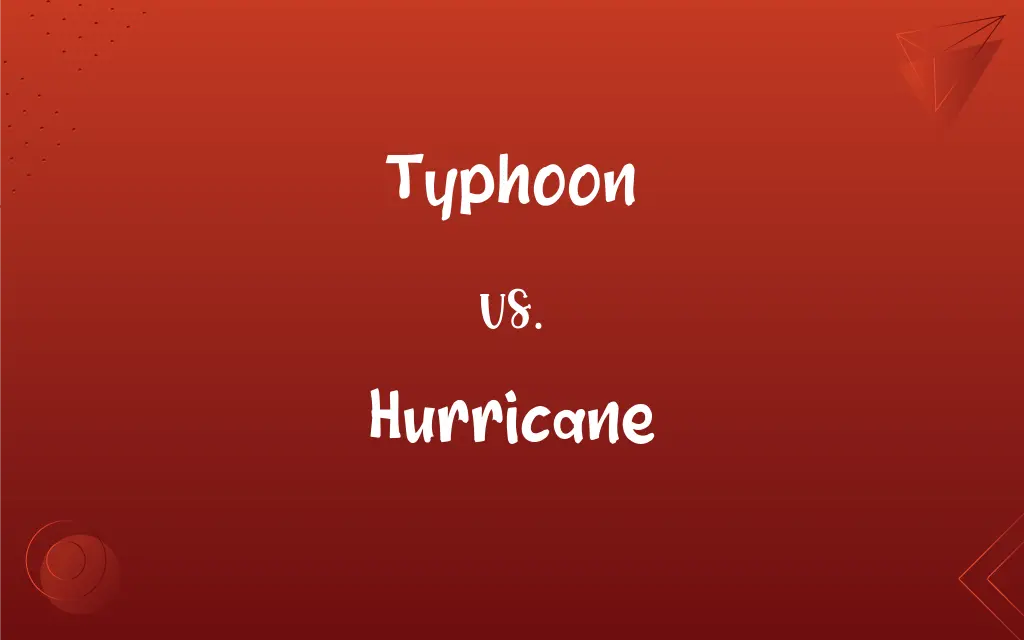Typhoon vs. Hurricane: What's the Difference?
Edited by Aimie Carlson || By Harlon Moss || Updated on October 14, 2023
A typhoon is a tropical storm in the Northwest Pacific, while a hurricane is a tropical storm in the Atlantic and Northeast Pacific.

Key Differences
Both typhoons and hurricanes are intense tropical cyclones, but the primary difference lies in their geographical location. A typhoon occurs in the Northwest Pacific region, while a hurricane originates in the Atlantic and Northeast Pacific regions. Thus, while both terms describe similar weather phenomena, they differentiate based on where they form and occur.
The naming convention of these storms has cultural and historical roots. Typhoons derive their name from the Chinese word "tai fung," which means "great wind." On the other hand, the word hurricane is believed to originate from the Taino Native American word "huracán," meaning "evil spirit of the wind." So, while typhoon and hurricane denote the same meteorological event, their etymology differs based on regional influences.
Scientifically speaking, there's no difference between a typhoon and a hurricane in terms of formation, intensity, or structure. Both result from warm ocean waters and atmospheric disturbances. When these cyclones form, they carry immense energy and moisture, leading to powerful winds and torrential rains. However, whether one refers to them as a typhoon or a hurricane is contingent upon the specific oceanic basin they're in.
In the world of media and communication, the distinction between typhoon and hurricane is essential for clarity. For instance, news agencies reporting about a tropical cyclone in the Philippines would call it a typhoon, while those covering a similar storm in Florida would term it a hurricane. This differentiation aids in ensuring accurate communication to the public, based on regional understanding.
To provide context with real-world examples, Typhoon Haiyan was one of the most potent typhoons on record and severely impacted the Philippines in 2013. In contrast, Hurricane Katrina, which hit the Gulf Coast of the U.S. in 2005, is one of the most devastating hurricanes in American history. Both events were catastrophic but occurred in different parts of the world, leading to the variance in naming.
ADVERTISEMENT
Comparison Chart
Region
Northwest Pacific
Atlantic and Northeast Pacific
Etymology
From the Chinese "tai fung"
From the Taino "huracán"
Formation
Warm ocean waters and atmospheric disturbances.
Warm ocean waters and atmospheric disturbances.
Examples
Typhoon Haiyan
Hurricane Katrina
Reporting
Commonly reported in Asian countries
Often reported in the Americas
ADVERTISEMENT
Typhoon and Hurricane Definitions
Typhoon
A typhoon is a tropical cyclone in the Northwest Pacific.
Typhoon Haiyan severely affected the Philippines in 2013.
Hurricane
A hurricane is a tropical cyclone in the Atlantic and Northeast Pacific.
Hurricane Katrina was one of the deadliest hurricanes in U.S. history.
Typhoon
The term "typhoon" has Chinese linguistic roots.
The word typhoon comes from the term tai fung.
Hurricane
Hurricanes form in the Atlantic Ocean and Northeast Pacific regions.
The U.S. Gulf Coast often braces for hurricane seasons.
Typhoon
Typhoons originate from the Northwest Pacific basin.
Countries like Japan and Taiwan often prepare for typhoon seasons.
Hurricane
Hurricanes bring powerful winds, torrential rains, and can lead to severe flooding.
Preparations and evacuations are crucial during a hurricane warning.
Typhoon
Typhoons are equivalent to hurricanes but differ in naming based on location.
A typhoon in Asia would be called a hurricane if it were in the Atlantic.
Hurricane
The term "hurricane" has Taino Native American linguistic origins.
The word hurricane is believed to derive from huracán.
Typhoon
Typhoons bring strong winds, heavy rains, and can cause massive destruction.
Coastal areas are especially vulnerable during a typhoon.
Hurricane
Hurricanes are the counterparts of typhoons, named based on their formation region.
A hurricane in the U.S. would be termed a typhoon if it happened in Southeast Asia.
Typhoon
A tropical cyclone occurring in the western Pacific or Indian Oceans.
Hurricane
A severe tropical cyclone having winds greater than 64 knots (74 miles per hour; 119 kilometers per hour), originating in the equatorial regions of the Atlantic Ocean or Caribbean Sea or eastern regions of the Pacific Ocean, traveling north, northwest, or northeast from its point of origin, and usually involving heavy rains.
Typhoon
A weather phenomenon in the northwestern Pacific that is precisely equivalent to a hurricane, which results in wind speeds of 64 knots (118 km/h) or above. Equivalent to a cyclone in the Indian Ocean and Indonesia/Australia.
Hurricane
A wind with a speed greater than 64 knots (74 miles per hour; 119 kilometers per hour per hour), according to the Beaufort scale.
Typhoon
(intransitive) To swirl like a hurricane.
Typhoon
A violent whirlwind; specifically, a violent whirlwind occurring in the Chinese seas.
Typhoon
A tropical cyclone occurring in the western Pacific or Indian oceans
FAQs
Why are they named differently?
The naming conventions have historical and cultural roots, reflecting regional influences.
Can typhoons and hurricanes cause tsunamis?
While rare, under specific conditions, they can induce storm surges, which are different from tsunamis.
Is the strength of a typhoon different from a hurricane?
No, both can range from mild to severe, and their categorization is based on wind speeds.
Which is more destructive, a typhoon or a hurricane?
Destruction depends on the storm's strength, not its name. Both can be equally devastating.
What is a typhoon?
A typhoon is a tropical cyclone originating in the Northwest Pacific region.
Where did the term "typhoon" originate?
It is believed to derive from the Chinese word "tai fung."
Do typhoons occur in the U.S.?
No, the U.S. experiences hurricanes, especially in the Atlantic and Gulf Coast regions.
Why do some countries use different names for these storms?
The naming reflects regional linguistic, cultural, and historical influences.
How do typhoons and hurricanes form?
Both form from warm ocean waters and atmospheric disturbances.
Which one lasts longer, a typhoon or a hurricane?
The duration of both can vary, and it's not dependent on the term but rather the storm's conditions and environment.
Can the same storm be both a typhoon and a hurricane?
No, the terms are location-specific, but the storm system is essentially the same.
Do hurricanes only affect the U.S.?
No, hurricanes can affect various regions, including Central America, the Caribbean, and even parts of Europe.
Are there any prediction systems in place?
Yes, meteorological departments use satellite imagery and models to predict their paths and intensities.
Can typhoons and hurricanes merge?
It's rare, but if two cyclones approach each other, a phenomenon called the Fujiwhara effect can occur, causing them to orbit around a common point.
How does a typhoon differ from a hurricane?
The primary difference is their location: typhoons form in the Northwest Pacific, while hurricanes are in the Atlantic and Northeast Pacific.
How about the term "hurricane"?
It's thought to come from the Taino Native American word "huracán."
Are typhoons frequent in Asia?
Yes, countries like the Philippines, Taiwan, and Japan often experience typhoons.
Are there other names for these storms worldwide?
Yes, in the South Pacific and Indian Ocean, they're often called cyclones.
How can we protect ourselves from a typhoon or hurricane?
Preparation, timely evacuation, and adhering to local advisories are crucial.
How are typhoons and hurricanes categorized?
They are categorized based on their wind speeds, often using the Saffir-Simpson scale for hurricanes.
About Author
Written by
Harlon MossHarlon is a seasoned quality moderator and accomplished content writer for Difference Wiki. An alumnus of the prestigious University of California, he earned his degree in Computer Science. Leveraging his academic background, Harlon brings a meticulous and informed perspective to his work, ensuring content accuracy and excellence.
Edited by
Aimie CarlsonAimie Carlson, holding a master's degree in English literature, is a fervent English language enthusiast. She lends her writing talents to Difference Wiki, a prominent website that specializes in comparisons, offering readers insightful analyses that both captivate and inform.































































